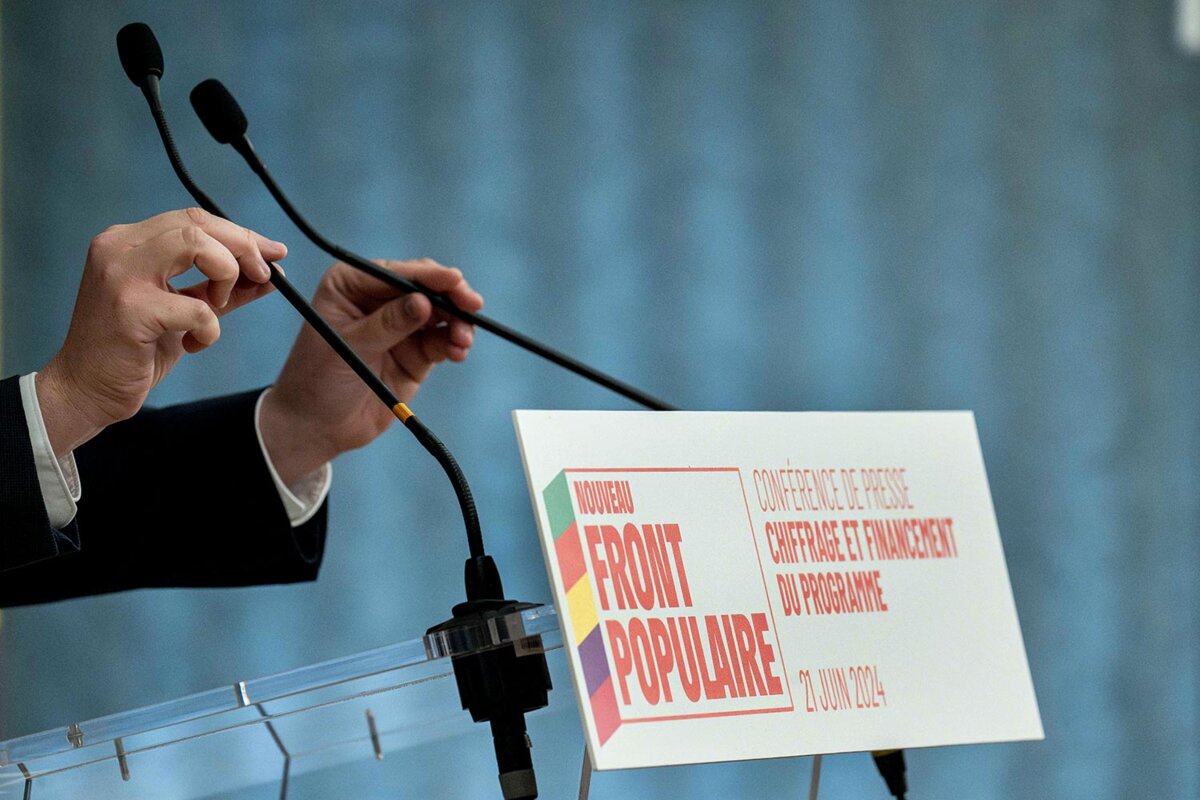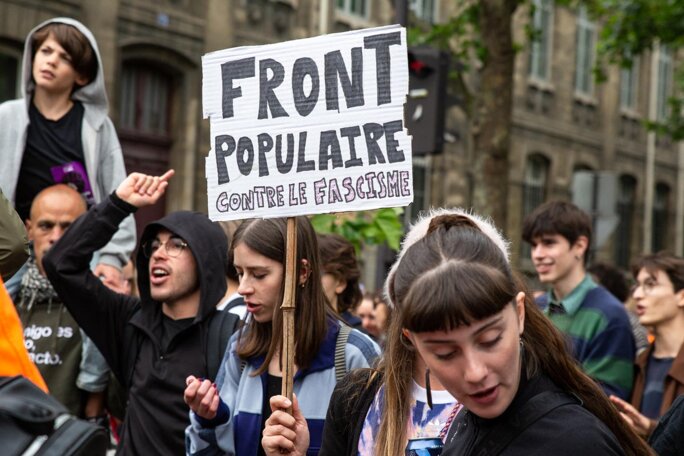The campaign has barely begun, but the strategists of the New Popular Front Populaire (NFP) are already looking towards the second round of the Parliamentary elections, which are taking place on June 30th and July 7th. And for good reason: with what is looking set to be a collapse in support for the presidential camp, this new alliance of the Left and greens must come up with a powerful strategy to attract as broad a support as possible for its candidates in the crucial second of voting. In the voting system for French Parliamentary elections, this second round usually boils down to a head-to-head contest between the two most successful candidates from the first round. And in many cases on July 7th this will mean a duel between the NFP and the far-right Rassemblement National.
With this in mind, the NFP can take some pride in having managed, thanks to its unity, to mobilise its activist base to conduct a grassroots and “local” campaign – a vital factor for the incumbent candidates who were often elected by only a few votes in the 2022 elections against opponents from the far-right party. The number of local campaigning groups from the radical-left La France Insoumise (LFI) and other member parties in the NFP has surged, particularly in the crucial “swing seats” that can change an election's outcome. It is at this level that efforts are being focused.
For, once again , victory will be determined by a “very narrow margin” in many places, which is why the number of proxy votes that will be cast will be a “major factor” given the election dates – the poll has come at short notice at a time when many people will be on holiday - says Marine Tondelier, the national secretary of the green Les Écologistes party, part of the NFP.

Enlargement : Illustration 1

The challenge for the NFP strategists is to firstly mobilise the left-wing electorate, but also to inspire those who tend to abstain to vote in the first round. All its member parties agree that merely calling for voters to turn out to stop the far right is not enough. They say the NFP cannot just be in defensive mode but must also offer something positive. This is the goal of their manifesto, which marks a clear break from “supply-side” economic policies and sets out concrete measures to be implemented according to a predefined timeline during the first 100 days.
Encouraging a sense of liberation
The challenge is now to get this strategy to strike the right chords during this short campaign. In every meeting she attends, Clémentine Autain (LFI) emphasises the changes that would result from the NFP coming to power. “We need to ensure that this positive narrative triumphs over the negative one: we have ten days to build the sense of joy that could exist if we come to power,” she says. Stronger public services, better-paid work, and the repeal of the recent pension reform – which raised the retirement age to 64 - are among the topics being used to rally as many people as possible.
“We must demonstrate that the NFP's political offering is not merely defensive: it's an opportunity for the working and middle classes, who have felt betrayed since the mid-1980s, to reclaim everything that's been stolen from them. It's an historic opportunity to claw back social rights that have been taken away,” argues David Cormand, a green Member of the European Parliament and one of the key thinkers in his party.
But the Left has to confront the issue of how to broaden its electoral base towards the centre of the political spectrum. This is especially important given that projections from the European elections show that, apart from constituencies where it is the incumbent, the Left performs best in those constituencies that voted in 2022 for a candidate from the centrist presidential majority. “We have identified the constituencies where, in 2022, the candidate from the presidential majority won by a few votes against socialist candidates: there is significant potential for change in Ardèche, Drôme, Dordogne, Loire-Atlantique, Meurthe-et-Moselle, and Marseille,” says Pierre Jouvet, who is in charge of elections for the Socialist Party (PS), referring to constituencies spread right across France.
The NFP is therefore better placed than the Nouvelle Union Populaire, Écologique et Sociale (NUPES) – the leftwing alliance that fought the 2022 elections - for the current contest. This is because the radical left LFI has now relinquished a hundred constituencies in favour of the PS, whose presence on the voting slip is likely to be more reassuring for a moderate electorate. The nature of the campaign is also different. “It's a dynamic synthesis of leftwing forces within which LFI has agreed not to dominate on its own. The NFP is more than a coalition; it is a new political entity with no indisputable leadership,” explains David Cormand.
Countering the demonisation of the Left
However, the demonisation of the Left, the radical-left LFI in particular, and the equating of the NFP with the far-right Rassemblement National (RN) – a false equivalence that has been used by Emmanuel Macron himself - risks damaging its electoral prospects. The accusations of anti-Semitism are already weighing heavily on the election campaign. “These campaigns led by a dominant ideology which incessantly questions our relationship with anti-Semitism are absurd. I will never be slow to criticize my own side, but it's madness to be equated with the RN on anti-Semitism,” asserts Clémentine Autain. She is calling on the “elites, especially in the media and economic sectors, “ to “wake up”, saying they bear “significant responsibility for ensuring we do not descend into chaos”.

Enlargement : Illustration 2

Even though the indifference or complacency of some on the Left towards anti-Semitism is not a residual problem, this smear campaign could be fatal for the NFP. For it could discourage, under a false pretext, a moderate, centrist electorate – one disillusioned with Macronism - from voting for the alliance as a bulwark against the far-right.
“I get the feeling that Emmanuel Macron is promoting the idea of a protest vote against us in the second round, which worries me: he is normalising the RN and demonising the NFP, it’s disgraceful,” observes Michel Sala, outgoing LFI MP for the Gard département or county in the south of France. The challenge for the coalition is therefore to avoid a repeat of the 2022 experience, where a republican front – which in the past has been constructed by mainstream parties to urge the electorate to vote against the far right - operated “in reverse”. This prevented leftwing NUPES candidates from being elected in several places in the second round of those Parliamentary elections.
If the Macronists are sincere in their fight against the far right, they'll face a moment of truth.
For example, outgoing LFI MP Florian Chauche recalls how in 2022 part of the rightwing Les Républicains (LR) electorate in his constituency voted for his RN opponent in the second round. “The risk is there, and more so than ever now,” he says, after the LR leader Éric Ciotti agreed an alliance with the RN, a move which split the rightwing party.
To counter these dangerous switches of allegiance between the first and second rounds, the NFP must inspire confidence in its democratic stance, just as it has done with its economic credibility by costing its manifesto (see box below). This is what political scientist Frédéric Sawicki argues on the website AOC: in order to bring on board voters beyond the usual leftwing electorate “it's up to the leftwing parties and candidates to show themselves to be exemplary democrats”. The various parties within the NFP are working on doing exactly that.
The danger of three-way contests
By announcing that the LFI would call on voters to vote against the RN candidate in the event of a head-to-head second round duel against a candidate from the current ruling majority, Mathilde Panot, former president of the LFI group in the National Assembly, has distanced herself from Emmanuel Macron’s irresponsible attitude, despite all the disagreements she has with him and his ruling party. “We will be utterly resolute in performing this role as democratic, republican bulwark,” socialist Pierre Jouvet also promises.
The NFP emphasises this aspect not just on moral grounds but also because it could face a large number of three-way contests in the second round of the Parliamentary elections. For elections to the National Assembly all candidates winning the support of more than 12.5% of registered voters go through to a second round. Should the presidential majority candidates – who will, in most cases, come in third, without any chance of winning – choose to stay in the race under the “neither the RN nor the NFP” banner, this would lead to the election of a large number of far-right MPs. “It's the president of the Republic's responsibility, and that is where the debate must be focused: if the Macronists are sincere in their fight against the far right, they will face a moment of truth, and it will be crucial for the number of seats we can win,” says Pierre Jouvet.
“Only an awareness of [the Left’s] weaknesses, a humble willingness to unite and work together, can allow us to find the desired balance between boldness and caution that's likely to give us every chance in the next election,” historian Gilles Candar wrote after the unexpected dissolution of the National Assembly by President Macron. This approach seems to have been adopted by the party leaders within the New Popular Front (PS, LFI, Les Écologistes, and the French Communist Party), who consult with each other daily during morning coordination meetings.
In terms of rallying voters beyond the confines of the Left, several NFP strategists have also suggested invoking an argument around national stability, by promising to heal the country’s divisions. “The NFP’s proposals are the most likely to bring peace, including when it comes to restoring solidarity and thus security in our society,” argues David Cormand.
Unlike Emmanuel Macron, who thought he could govern without compromise, ignoring the leftwing electorate that had propelled him to power in order to block the far right, the leftwing NFP pledges to take into account the tripartite nature of political life. “Everything suggests that if we are to govern, we will have to seek a broader majority than just the NFP MPs. We must find a centre of gravity that allows us to lead the country, one which doesn't water down our political offer, but which does mend damaged social relations in this country,” asserts David Cormand.
While the battle against the far right promises to be tough, and while internal tensions within the NFP will undoubtedly erupt after the elections, the alliance is currently rising to the occasion. “There's no reason, no justification to fear the Left coming to power. On the contrary, it would mean new rights and new freedoms, a necessary liberation,” concludes Pierre Jouvet.
-------------------------------------------------------------------------
- The original French version of this article can be found here.
English version by Michael Streeter


